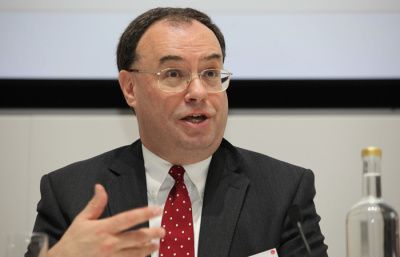
Bank of England governor Andrew Bailey said the central bank’s resolve to drive down inflation is “unwavering” despite yesterday’s quarter-point rate cut.
“Our commitment to the 2% inflation target is unwavering,” said Bailey in a speech at the Reykjavík Economic Conference in Iceland this morning.
The governor’s comments come after the Bank’s rate-setting Monetary Policy Committee voted to cut the base rate by 0.25% to 4.25% yesterday, the second reduction in the cost of money this year.
However, the cost of living is currently at 2.6%, above the central bank’s 2% target.
The Bank also forecasts that energy prices are “likely” to drive up inflation to 3.5% in the third quarter of the year, before “falling back thereafter”.
However, markets were convinced the Bank would cut rates after the unsettling effect on world trade and money markets caused by US President Trump’s April tariffs, which placed import taxes of at least 10% on some 75 countries.
Bailey told his Reykjavík audience: “A sequence of unprecedented global shocks has created a very challenging environment for monetary policy.
“The largest pandemic in a century, the largest war in Europe since 1945, and now a trade war between the world’s two largest economies — these are not small and simple disturbances to aggregate demand, and they come against a backdrop of low productivity growth and ageing populations.
“While it remains to be seen how recent changes to global trade policies will play out and what the effects on our economies will be, the effects of the pandemic and Russia’s brutal war on the Ukrainian people are fresh in our minds.
“Our economies have suffered, inflation has surged. These have been hard times for businesses and households, not least those on lower incomes.”
Yesterday, the UK and the US signed a limited trade agreement on specific sectors — notably cars, steel and agriculture — which reduced some tariff measures.
However, some commentators pointed out that although import charges are lower than they were a week ago, they are higher than they were at the start of the year.
Bailey added: “It’s good news in a world where it will leave the effective tariff rate higher than it was before all of this started.”
Goldman Sachs analyst James Moberly concluded in a note to clients that “a weaker [UK] economy — including softer growth, pay gains and inflation — will push the Monetary Policy Committee into faster rate cuts in the second half of the year”.
Goldman forecasts a pause in Bank rate reductions in June but expects “sequential 25bp rate cuts from August to an unchanged terminal rate of 2.75% in March 2026.”
Last night, Bailey told the BBC that the country had to “rebuild” its trade relationship with the European Union, which accounts for just over half of UK exports.



